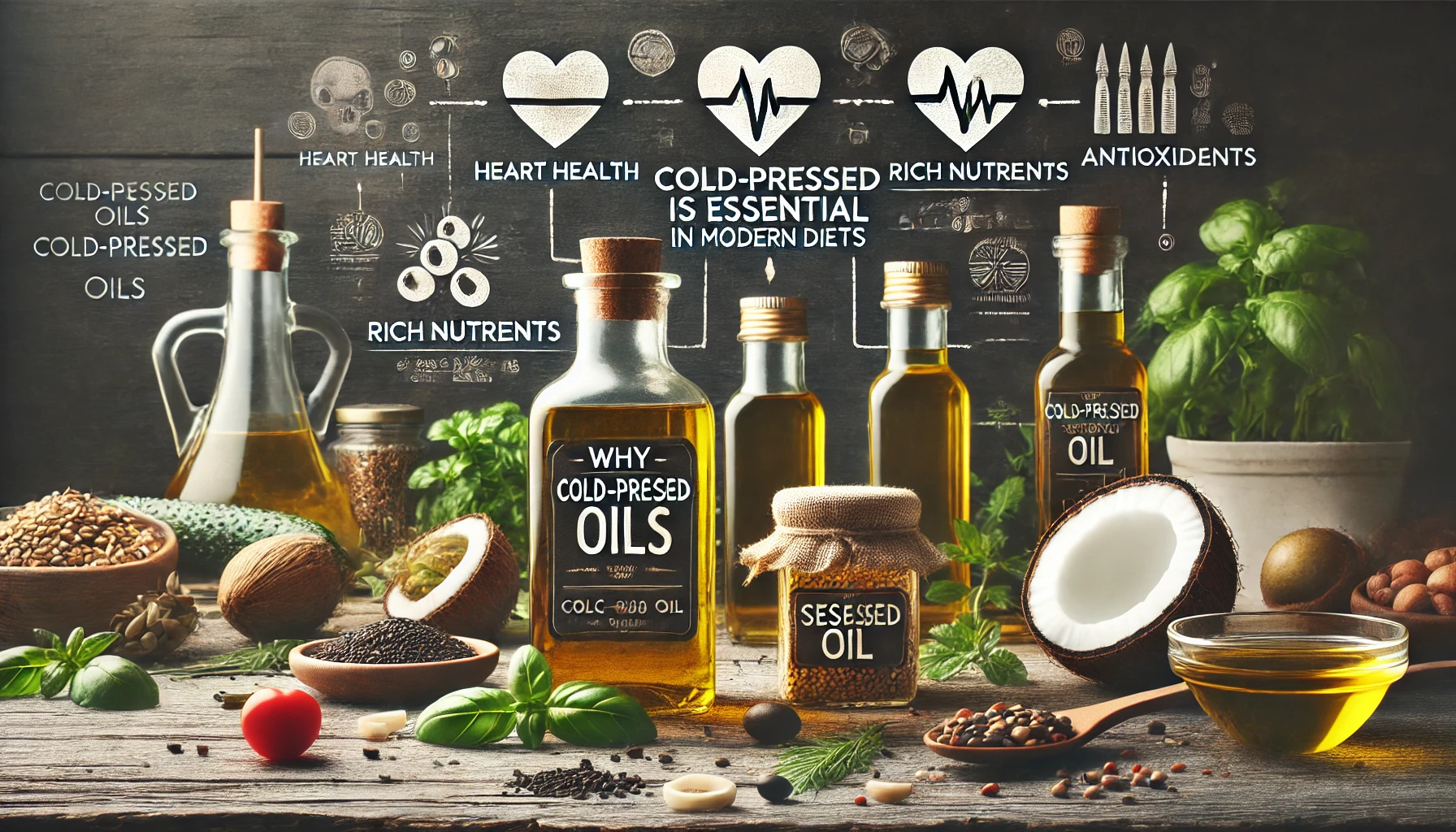- You have no items in your shopping cart
- Subtotal: ₹0.00
Cold-Pressed Oil in Modern Diets: Traditional Wisdom or Outdated Trend?
In today’s fast-paced world, people are becoming more conscious about the food they consume, leading to a resurgence of traditional health practices. One such practice is the use of cold-pressed oils, which are extracted using age-old methods that preserve the nutritional integrity of seeds, nuts, and fruits. These oils are now considered a premium product due to their nutrient retention and health benefits, but they also come with a higher price tag compared to their commercially refined counterparts. This has led many to question whether cold-pressed oils are a necessity in modern diets or just a passing trend.
Are cold-pressed oils essential for health in today’s world, or are they merely a rebranded version of something ancient, repackaged to fit the modern consumer’s demand for health trends? To explore this, let’s dive deep into the history, benefits, and relevance of cold-pressed oils in the modern context.
The History and Traditional Roots of Cold-Pressed Oils
Cold-pressed oils have a long-standing history, particularly in Asian and Mediterranean cultures. Traditionally, oils were extracted from seeds, nuts, or fruits using a method that applied mechanical pressure without generating significant heat. This method, commonly referred to as cold pressing, ensures that the natural nutrients, flavor, and aroma of the oil are retained.
In India, oils such as sesame, coconut, and groundnut were staples in many households. These oils, extracted using wooden churners (often called “chekku” or “ghani” in Indian languages), were considered vital for both cooking and medicinal purposes. In Mediterranean regions, olive oil has been a cornerstone of the diet for thousands of years, consumed not only for its flavor but for its health benefits as well.
However, with the advent of industrialization, the method of oil extraction shifted toward using heat and chemicals to extract larger quantities of oil more quickly. These refined oils became more accessible and cheaper, but at the cost of losing many of the nutrients that cold-pressed oils naturally retain.
Understanding the Cold-Press Extraction Process
To fully appreciate the role of cold-pressed oils in modern diets, it’s important to understand how these oils are made and how they differ from refined oils.
How Cold-Pressed Oils are Made
The cold-press extraction process involves crushing seeds or nuts to extract oil without the application of external heat. This process ensures that the oil retains its natural flavor, aroma, and nutritional profile, including essential fatty acids, vitamins, and antioxidants.
- Mechanical Pressure: Seeds or nuts are placed into a mechanical press, where they are slowly crushed to release the oil. The pressing is done at a low temperature (usually below 120°F), which prevents the destruction of sensitive nutrients like vitamin E and antioxidants.
- No Chemicals or Solvents: Unlike refined oils, which are processed using chemical solvents (like hexane) to extract the maximum amount of oil, cold-pressed oils are free from chemical additives. This makes cold-pressed oils purer and more natural.
- Nutrient Retention: The lack of heat during extraction means that cold-pressed oils retain their natural antioxidants, vitamins (especially vitamin E), and unsaturated fats, which are essential for various bodily functions.
Refined Oils: The Commercial Alternative
In contrast, refined oils are extracted using high temperatures and chemical solvents to maximize yield. The oils are then bleached and deodorized to remove impurities and odors. While this process increases the oil’s shelf life, it also strips the oil of many beneficial nutrients.
Refined oils, such as soybean, canola, and corn oil, are prevalent in modern cooking due to their affordability and long shelf life. However, the trade-off is that these oils lack the nutrient density of cold-pressed oils.
Health Benefits of Cold-Pressed Oils
The resurgence of cold-pressed oils in modern diets is largely due to the various health benefits they offer. Let’s explore some of the key benefits that make cold-pressed oils a valuable addition to any diet.
1. Rich in Healthy Fats
Cold-pressed oils are a rich source of monounsaturated and polyunsaturated fats, which are considered heart-healthy fats. These fats help reduce bad cholesterol levels (LDL) and increase good cholesterol (HDL), promoting cardiovascular health. Oils like olive, flaxseed, and sesame oil are excellent examples of cold-pressed oils that provide these healthy fats.
- Monounsaturated Fats: These fats are known to help reduce the risk of heart disease and improve insulin sensitivity. Cold-pressed olive oil is a prime example, with research showing that its high content of monounsaturated fats is linked to lower incidences of heart disease in Mediterranean populations.
- Polyunsaturated Fats: Omega-3 and Omega-6 fatty acids, found in cold-pressed flaxseed and walnut oils, are essential for brain function and cell growth. These fats also have anti-inflammatory properties, which can help reduce the risk of chronic diseases such as arthritis and cancer.
2. High in Antioxidants
Cold-pressed oils are packed with antioxidants, which protect the body from oxidative stress and free radical damage. Vitamin E, found in oils like sunflower and almond oil, is a powerful antioxidant that supports skin health, reduces inflammation, and boosts the immune system.
Antioxidants are also important for protecting cells from damage that could lead to chronic diseases like cancer and heart disease. In this sense, cold-pressed oils serve not only as a source of healthy fats but also as a defense against cellular damage.
3. No Harmful Chemicals
As mentioned earlier, cold-pressed oils are free from harmful chemicals and additives, which makes them a safer choice for consumption. Refined oils often contain residues of chemical solvents used during the extraction process, which could have negative health effects when consumed over time. By choosing cold-pressed oils, you avoid these potential risks and consume oils in their most natural form.
4. Better Flavor and Aroma
One of the most noticeable benefits of cold-pressed oils is their superior flavor and aroma. The slow extraction process preserves the natural essence of the seeds or nuts, giving these oils a rich, robust flavor that enhances the taste of food. Whether you’re drizzling cold-pressed olive oil over a salad or sautéing vegetables in cold-pressed coconut oil, the flavor is unparalleled compared to refined oils.
5. Anti-Inflammatory Properties
Many cold-pressed oils, particularly those rich in Omega-3 fatty acids (such as flaxseed oil), have anti-inflammatory properties that can help reduce the risk of chronic diseases. Inflammation is a major contributor to many health problems, including heart disease, arthritis, and even depression. By incorporating cold-pressed oils into your diet, you can help reduce inflammation and improve overall health.
Cold-Pressed Oils in Modern Diets
Now that we’ve explored the benefits of cold-pressed oils, the question remains: how do they fit into modern diets, and are they essential for health in today’s world?
1. Cold-Pressed Oils in Popular Diets
Cold-pressed oils have become a staple in many popular diets, including the Mediterranean diet, ketogenic diet, and plant-based diets. These oils provide a healthy source of fat, which is important for energy, hormone production, and cell function.
- Mediterranean Diet: This diet emphasizes the use of cold-pressed olive oil as the primary source of fat. Numerous studies have shown that the Mediterranean diet, rich in cold-pressed oils, reduces the risk of heart disease, stroke, and certain cancers.
- Ketogenic Diet: The ketogenic diet relies on high-fat, low-carbohydrate foods to promote fat burning and weight loss. Cold-pressed oils like coconut oil and avocado oil are ideal for this diet, as they provide a clean source of fat that supports ketosis.
- Plant-Based Diets: For those following a plant-based diet, cold-pressed oils offer a valuable source of essential fatty acids that are often lacking in vegetarian and vegan diets. Oils like flaxseed and walnut oil are rich in Omega-3s, which are important for brain health and inflammation reduction.
2. Cold-Pressed Oils in Everyday Cooking
Incorporating cold-pressed oils into everyday cooking is easier than you might think. These oils can be used for a variety of culinary purposes, from salad dressings to sautéing and even baking.
- Salad Dressings and Marinades: Cold-pressed oils like olive oil and flaxseed oil are perfect for making fresh, flavorful salad dressings and marinades. Their rich taste enhances the flavor of raw vegetables and greens, making them a healthier alternative to store-bought dressings.
- Sautéing and Frying: While cold-pressed oils have a lower smoke point than refined oils, many of them can still be used for light sautéing and frying. For instance, cold-pressed coconut oil and avocado oil have relatively high smoke points, making them suitable for stir-frying and other medium-heat cooking methods.
- Baking: Cold-pressed oils can also be used in baking as a substitute for butter or margarine. Cold-pressed coconut oil, in particular, works well in baked goods, adding a subtle flavor and healthy fats.
3. Cold-Pressed Oils vs. Other Fats
It’s important to note that cold-pressed oils are not the only healthy fats available in modern diets. Other sources of healthy fats include avocados, nuts, seeds, and fatty fish. However, cold-pressed oils offer a unique combination of healthy fats, antioxidants, and nutrients that make them a valuable addition to any diet.
While many refined oils, such as canola oil and vegetable oil, are heavily processed and stripped of their nutrients, cold-pressed oils retain their natural goodness. By choosing cold-pressed oils, you’re opting for a more nutrient-dense source of fat that supports overall health.
Is Cold-Pressed Oil Worth the Price?
One of the most common concerns about cold-pressed oils is their price. Compared to refined oils, cold-pressed oils can be significantly more expensive. This leads many people to question whether the higher price is justified.
Why Are Cold-Pressed Oils More Expensive?
The higher cost of cold-pressed oils is due to several factors:
- Labor-Intensive Process: The cold-press extraction method is slower and more labor-intensive than the industrial process used to make refined oils. This naturally drives up the cost of production.
- Lower Yield: Cold-pressing produces less oil compared to chemical extraction methods. Since there’s no use of solvents or heat to extract every last drop, the yield is lower, making the oil more expensive.
- Higher Quality: Cold-pressed oils are of higher quality because they retain their natural nutrients and flavor. This makes them a premium product compared to refined oils, which have been stripped of many beneficial compounds.
Are Cold-Pressed Oils Worth the Investment?
Despite the higher cost, many people believe that cold-pressed oils are worth the investment for the following reasons:
- Nutritional Value: Cold-pressed oils retain their natural vitamins, antioxidants, and healthy fats, making them a more nutritious option than refined oils. If you’re looking to maximize the nutritional value of the fats you consume, cold-pressed oils are a superior choice.
- Health Benefits: The health benefits of cold-pressed oils, including their anti-inflammatory properties and ability to improve heart health, make them a valuable addition to any diet. Investing in high-quality oils can have a positive impact on your long-term health.
- Flavor and Aroma: Cold-pressed oils offer a richer flavor and aroma than refined oils, enhancing the taste of your food. For those who value the quality and taste of their meals, the investment in cold-pressed oils is worthwhile.
Conclusion: Are Cold-Pressed Oils a Necessary Part of Modern Diets?
Cold-pressed oils, far from being an outdated trend, offer significant health benefits that make them a valuable addition to modern diets. With their rich nutrient profile, superior flavor, and lack of harmful chemicals, cold-pressed oils stand out as a healthier alternative to refined oils.
Incorporating cold-pressed oils into your diet can help reduce inflammation, support heart health, and provide essential fatty acids that are crucial for overall well-being. While they may come at a higher price, the health benefits and superior quality of cold-pressed oils justify the investment.
As more people become conscious of what they consume, cold-pressed oils are gaining popularity for all the right reasons. Whether you’re following a Mediterranean diet, a ketogenic plan, or simply looking to make healthier choices, cold-pressed oils are a must-have in any kitchen.




